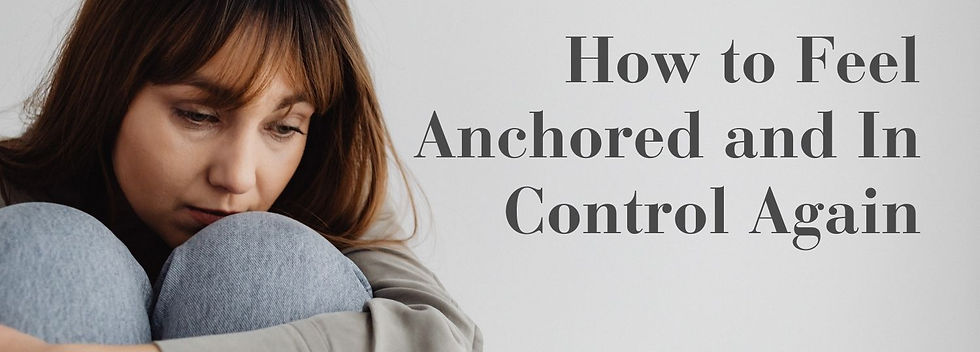.jpg)
For adults who lived through trauma, the world can feel unpredictable, even when everything looks fine on the outside. One moment you're managing just fine, the next you're overwhelmed, irritable, shut down, or spinning in anxiety, and sometimes, it doesn’t make sense. No, there is nothing wrong with you. Your nervous system did what it had to do to help you survive. But now, it may be holding onto old habits that no longer serve you.
Feeling anchored isn’t about “fixing” yourself. It’s about learning a skill that may not have been safe to use in the past or available. This skill involves working with your emotions, rather than letting them take over.
What It Means to Feel Anchored on the Inside
When you are anchored inside, you can still experience stress, sadness, or anger, but these emotions don’t knock you down. You stay connected to yourself, even when things get hard. You have space between the feeling and what you do next. You can respond to the event, not just react. Even if you are pushed past your desired limits, you can get back to calm faster. You can think clearly when things feel chaotic.
Here’s what life can feel like when you’re anchored:
-
You can pause before saying something you’ll regret.
-
You can make decisions without panic or shutdown.
-
You can feel anger or grief without being consumed by it.
-
You can stay connected to people even when you’re hurt or overwhelmed.
It’s not about being calm all the time. It’s about being rooted in yourself, even when things shake around you.
Why Trauma Makes This Hard
Trauma, whether it is a single event or something chronic like emotional neglect, can throw your nervous system into high alert. Your brain and body learn to expect danger, even when it’s not there. Feelings like fear, anger, or shame can hit hard and fast, before your thinking brain has a chance to catch up.
Maybe growing up, no one taught you how to sit with hard feelings safely, or the only way to survive was to shut your emotions down entirely. If you lived through trauma, this isn’t a personal failing. It’s a survival response. But what helped you survive then might be the very thing hurting you now.
The Good News: You Can Learn to Anchor Yourself
Feeling anchored isn’t something you either have or don’t. It’s not a personality trait. It’s a learned skill, and it’s never too late to build it.
You can retrain your nervous system. You can develop tools and practices that help you return to an anchored state more easily. You can widen your window of tolerance, so everyday life doesn’t feel like it’s pushing you past your limits.
This work doesn’t come from willpower or “thinking positive.” It comes from practicing small, repeatable actions that help your body and brain feel safe enough to let go of old patterns.
What It Can Look Like in Daily Life
-
Breathing deeply when you feel overwhelmed to signal safety to your body.
-
Naming your feelings - “I’m feeling scared” instead of “I shouldn’t feel this way.”
-
Grounding in the present by focusing on what you see, hear, or touch around you.
-
Connecting with safe people because anchoring often happens through healthy relationships.
-
Letting yourself rest, rather than pushing through everything all the time.
These aren’t magic tricks. But over time, they change your internal landscape. They help you stay anchored, even when the world feels shaky.
If life feels overwhelming, moving too quickly, or feels lifeless, you may need support learning how to anchor yourself when old survival responses try to take over.
You deserve to feel in control, connected, and rooted in yourself, not just sometimes, but consistently.
